Soap. Water. Elbow grease. These are all the things you need to do dishes, right? Not in my book! As I mentioned on Tuesday, I h-a-t-e hate doing dishes. But, do you know what I hate more? Dishes that are poorly done. I hate having Monday morning’s oatmeal on my bowl for Tuesday evenings tortilla soup. It’s cross contamination and its gross (to me, at least). I’m not saying I’m lazy, but I believe in MAXIMUM EFFICIENCY. If there is an easier, more effective, less time-consuming way to do something, then I do that thing.
So, imma let you in on a something I’ve discovered out of frustration and necessity. I have three secrets to doing better dishes and the tools you need are probably already in your house. right. now.
The first is Baking Soda. You’ve probably got a box in the back of the fridge or in the 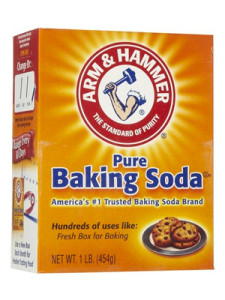 pantry, but baking soda is like my number one go-to secret weapon for doing dishes- or, at least a certain type of dishes. China, silverware, glasses… all of those can be washed however you like… but Tupperware, pots/pans, shmancy knives, wooden utensils, ice cream scoops, cookie sheets, and anything else that needs special attention DEMANDS baking soda. Baking soda is not only a super-gentle, yet super-strong abrasive substance that cuts through crud without ruining delicate surfaces… but it is ALSO awesome for absorbing oils and smells that regular washing seems to leave.
pantry, but baking soda is like my number one go-to secret weapon for doing dishes- or, at least a certain type of dishes. China, silverware, glasses… all of those can be washed however you like… but Tupperware, pots/pans, shmancy knives, wooden utensils, ice cream scoops, cookie sheets, and anything else that needs special attention DEMANDS baking soda. Baking soda is not only a super-gentle, yet super-strong abrasive substance that cuts through crud without ruining delicate surfaces… but it is ALSO awesome for absorbing oils and smells that regular washing seems to leave.
- Pots and Pans- If you wash a sauce pan, dry it, and can STILL smell what you cooked for dinner, then is that pan really clean? Try it next time. Sniff your pan. Yeah. Sniff it, I said. If it smells like something, then SOMETHING is still on your pan; especially if you are using cooking oils. I keep a medium, square Tupperware container filled with baking soda on deck at all times by my sink for all the things that require it. Simply flick a teaspoon, or so, of baking soda into your pan and rub the surface. Watch as the baking soda absorbs the oil and smells and then rinses clean with water. No more smells. No more greasy residue. Just clean pots and pans.
- Tupperware- After a lot of usage and storage of spicy things, Tupperware can start to get grungy. That’s because plastic is porous and absorbs oils, spices, and colorings- that’s why you can never get that curry stain/smell out of your Tupperware. Baking soda to the rescue. Just make a paste of baking soda and water (more baking soda than water) and massage into your Tupperware. You will be amazed/disgusted at how your baking soda starts to absorb color and oils. Rinse it thoroughly and you are good to go.
- Schmancy Knives- First, if you didn’t know, you should… schmancy knives should never go in the dishwasher. If you have invested in having good knives, then you should take care of them. Baking Soda is AWESOME for knives. Again, make a paste (I make the paste on my gloved fingers by dampening my fingers and then sticking them into my Tupperware box of baking soda) and gently massage the knife blade and handle, thoroughly rinsing, and then drying and replacing it back in the knife block.
- Wooden Utensils, Ice Cream Scoops, and Cookie Sheets- Wooden utensils work on the same principle as Tupperware in that they are porous. Cookie Sheets work on the same principle as pots and pans in that if you roast a chicken on a cookie sheet then chances are there is STILL chicken grease remaining your pan after you swipe it down with a sponge. Ice cream scoops generally have a core that is specifically designed to make scooping ice cream easier and as such should be treated differently from your spoons. Again, simple paste!
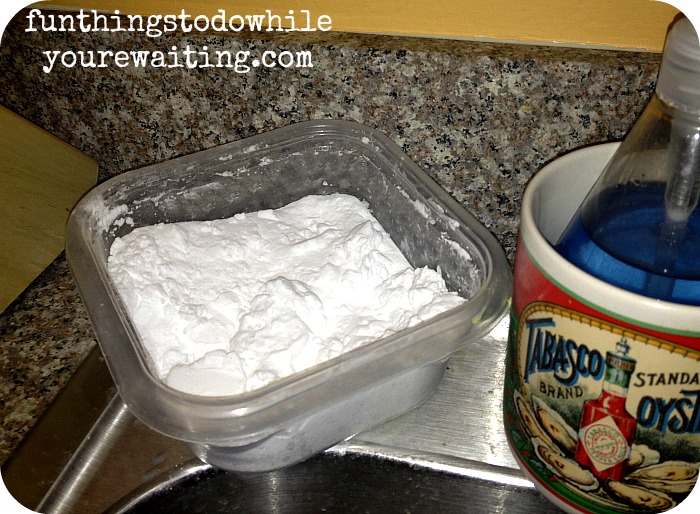
Almost everything tricky can be cleaned by a simple baking soda paste. Coffee/Tea stains in your mug? Baking soda paste. Greasy pesto residue in your food processor? Baking soda paste. Not only is it super effective, but it is also SUPER cheap. How can you NOT love it?! Just make sure to rinse thoroughly!
My second secret weapon is a wooden skewer. Whether they are from a barbeque 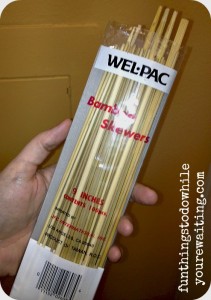 you threw when you made kabobs or you have them for other reasons, a wooden skewer is essential in washing dishes. It is small, sharp, and long– fitting into places your hotdog fingers cant. It can clean out tiny holes, and penetrate deep ridges. My favorite example of why this is a great tool is a garlic press. Fresh-pressed garlic is a staple in our kitchen and if you don’t end up doing the dishes until the next morning, then dried, crusty garlic in your press is an inevitability. You can’t just scrub out the press, you will never get it completely clean. But, with a wooden skewer, you can make sure all of those holes are clear.
you threw when you made kabobs or you have them for other reasons, a wooden skewer is essential in washing dishes. It is small, sharp, and long– fitting into places your hotdog fingers cant. It can clean out tiny holes, and penetrate deep ridges. My favorite example of why this is a great tool is a garlic press. Fresh-pressed garlic is a staple in our kitchen and if you don’t end up doing the dishes until the next morning, then dried, crusty garlic in your press is an inevitability. You can’t just scrub out the press, you will never get it completely clean. But, with a wooden skewer, you can make sure all of those holes are clear.
My third secret weapon is wooden chopsticks. Who doesn’t have a few sets in a kitchen drawer from Chinese take-out? The wooden chopsticks work on the same principle as the skewers, but with more force and girth. Need to get that ring of latte from the bottom of your tall, small-mouthed travel mug? Wooden chopstick to the rescue. It, like it’s skinnier cousin the skewer, has the length but it also has the larger surfaced base. Also like the skewer, wood is porous and won’t cause damage like metal utensils if you need to scrape something. The best part about both the skewer and the chopstick? They are cheap, easily disposable, and readily available.
So, there it is! Three super-cheap, effective tools to help you up your dishwashing game!
Though (before I leave you) I’ve got one more tidbit of information that you might find interesting. Did you know, that when you are cleaning protein-based messes (milk, cheese, eggs, etc.) that washing them with hot water actually hinders your cleaning by continuing to cook your mess? If you wash your items with cold water, the messes come off much easier! Just (less) food (on your dishes) for thought!
Do you have any dishwashing secrets or tips? What are YOUR go-to tools?

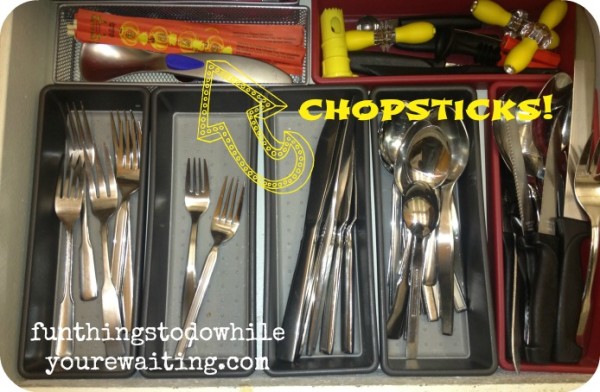
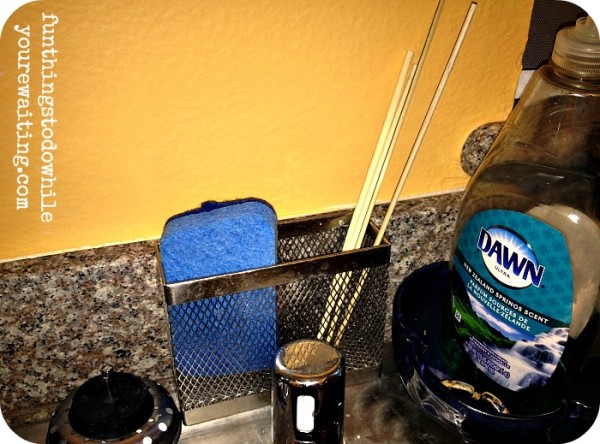

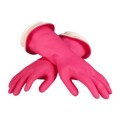
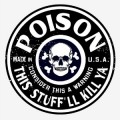

Baking soda is great as a toothpaste too. If you miss the minty taste you can use mouthwash.
Fascinating! I’ve always read about it, but never had the nerve to try!! What CAN’T Baking Soda do??? Love you, Bethy! Thanks for commenting!!!!